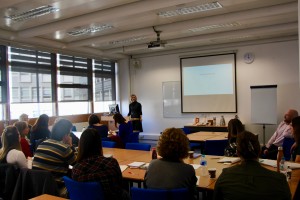The Scottish Interpretative Phenomenological Analysis Interest Group (SIPAIG)
We invite all students, academics and researchers to join the SIPAIG. The group meets monthly (typically on the last Wednesday afternoon of the month) from September to May and offers a relaxed, informal, supportive environment for those engaging in IPA research. Each meeting comprises a combination of workshops designed to support you in each step of the IPA process coupled with an open forum for advice, guidance and discussion on your own work. A number of keynote presentations also allow you to meet experienced IPA researchers and learn about their work. Membership is free to all GCU students/staff and costs £50 per year for non-GCU students/staff. We look forward to seeing you all there!
 (Professor Paul Flowers having a discussion with attendees at a one day workshop)
(Professor Paul Flowers having a discussion with attendees at a one day workshop)
(Dr. Adele Dickson presenting at a one day workshop)
Interpretative phenomenological analysis (IPA)
Interpretative phenomenological analysis (IPA) is a psychological approach to qualitative research which is primarily committed to the examination of how people make sense of their lived experiences of the phenomenon under investigation. Typically, such phenomena are experiences of personal significance (e.g. major life events or the development of an important relationship) and are experiences, which are likely to influence the course of a person’s life. IPA adopts an idiographic focus- it aims to offer a rich, in-depth insight into how a given person, in a given context, makes sense of a given phenomenon. It has theoretical origins in phenomenology, hermeneutics and ideography, and draws on key positions from Husserl, Heidegger, and Merleau-Ponty. It is distinct from other qualitative approaches due to the combination of its inductive, idiographic, interpretative and reflexive nature.
As IPA is committed to the detailed examination of the particular case, IPA studies usually employ small, homogenous samples that are purposively recruited. Semi-structured interviews are the exemplary (but not exclusive) form of data collection where transcripts are analysed systematically, taking a case-by-case approach. This is then presented as a narrative account where the researcher’s interpretation is detailed and supported by verbatim extracts from the participants’ accounts. The final product aims to generate an ‘insider’s perspective’ that captures what ‘it is like’ to experience a particular phenomenon from the perspective of a particular group of participants.
